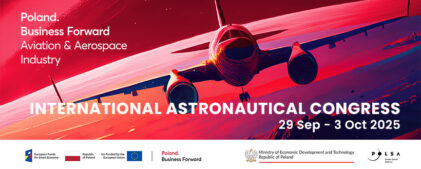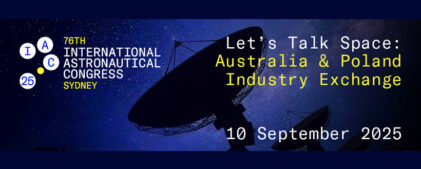Ignis is the first Polish technological and scientific mission to the International Space Station. During the 14-day mission, Polish ESA project astronaut Sławosz Uznański-Wiśniewski will conduct 13 scientific experiments and implement a comprehensive educational program for children and young people.
The Polish mission will be part of the Ax-4 mission to the ISS. The mission will launch from NASA’s Kennedy Space Center in Florida. The flight to the ISS will be carried out on a SpaceX Falcon 9 rocket, which will carry the Dragon crew capsule into orbit.
AX-4 mission composition:
- Peggy Whitson (USA) – mission commander
- Sławosz Uznański (Poland/ESA) – mission specialist
- Shubhanshu Shukla (India) – mission pilot
- Tibor Kapu (Hungary) – mission specialist
Axiom Space’s next commercial crewed mission, Axiom Space, will launch. Poland’s participation in this mission is the result of an agreement signed between the Ministry of Development and Technology and ESA to prepare and conduct a Polish technological mission to the ISS. The Polish Space Agency (POLSA), as an executive agency of the Ministry of Technology and Technology, is also involved in preparing the mission.
Scientific experiments during the IGNIS mission
During the 14-day mission, the crew will conduct research in microgravity, focusing on topics including astronaut health, the microbiome, new materials, and technologies, including the use of artificial intelligence. They will also engage in educational activities.
“The Ignis mission is a breakthrough not only for our space sector. Thirteen Polish experiments in technology, biology, medicine, and psychology, prepared by Polish scientists and engineers, will open up new opportunities for Polish research and, in the long run, increase Poland’s international competitiveness. Polish ESA project astronaut Dr. Sławosz Uznański-Wiśniewski will be the second Pole in space and thus the best ambassador for Polish science and industry, as well as an inspiration for future generations,” says Prof. Grzegorz Wrochna, former President of the Polish Space Agency.
“Naming the mission ‘Ignis’ symbolizes the spark of innovation and Poland’s ambitious contribution to space exploration. The partnership between ESA, Poland, and Axiom Space represents a significant milestone for commercial spaceflight, enabling the second mission with an ESA project astronaut and underlining Europe’s readiness for advanced space exploration, strengthening its role in shaping the future of space technology,” said Daniel Neuenschwander, Director of ESA’s Human and Robotic Exploration Directorate.
Nationwide educational program for the Ignis mission
The Ignis mission is sparking the imagination and curiosity of people of all ages. Sławosz Uznański-Wiśniewski, who will soon be sent to the International Space Station (ISS), is proving to all Poles that the dream of space flight is achievable.
To help children and young people take their first steps on the path to the stars, the Polish Space Agency (POLSA), in collaboration with the Ministry of Development and Technology (MRiT) and the European Space Agency (ESA), has prepared a nationwide educational program accompanying the Ignis mission. Other institutions are also involved in some of the activities, including the Ministry of National Education, ESERO Poland, the Space Research Centre of the Polish Academy of Sciences, and the Science Foundation. I like it! The program will include engineering projects, competitions, workshops, meetings with experts, and educational materials for schools.
The program is aimed at primary and secondary school students, university students, teachers, and educators. Its goals are to expand knowledge about the space sector, support the development of engineering skills, and engage children and young people in new technologies and science. The program also aims to support schools in implementing modern space education.
The IGNIS mission and the Polish Space Strategy
The implementation of the mission is consistent with the Polish Space Strategy, adopted by the Council of Ministers on January 26, 2017. The Polish Space Strategy aims to make the Polish space sector competitive in the European market. We assume that this goal will be achieved by, among other things, identifying the most promising technological areas, taking into account existing competencies, technological niches, and the development potential of the Polish space sector. An important element in improving the sector’s position is creating favorable conditions for its development, including by creating qualified personnel and conducting information and promotional activities.
One of the key tools for achieving the goals of the Polish Space Strategy is the implementation of a Polish technological and scientific mission, which will enable Polish entities to test new technologies and concepts in microgravity. This will be a unique opportunity for Polish companies and institutions to acquire “flight heritage,” placing Polish solutions in a privileged position in the context of future space programs, projects, and missions. As a unique orbital laboratory, the International Space Station enables research that would otherwise be impossible to conduct on Earth.
Poland not only aspires to participate in the most important research projects in the space sector, but also contributes to the development of global competences in the field of space exploration.
The implementation of the mission and the technological and scientific experiments carried out within its framework will bring a number of benefits, such as:
- accelerating the commercialization of Polish space technologies,
- inclusion of Polish products in global value chains,
- building unique competencies in the Polish space sector,
- favorable positioning of the Polish industry in relation to emerging trends related to manned space flights, construction of space infrastructure and space mining.
The participation of a Polish astronaut in a space mission – for the first time since 1978 – will enable Poland to join the elite group of countries that regularly carry out manned missions and research programs.
The implementation of the technological and scientific mission will also be a symbolic culmination of the development and progress of civilization achieved in recent decades by Polish scientists and engineers.
Read more: plinspace.pl







 Back
Back




